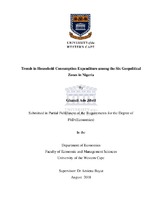| dc.contributor.advisor | Bayat, Amiena | |
| dc.contributor.author | Jibril, Ghazali Ado | |
| dc.date.accessioned | 2018-07-23T10:04:03Z | |
| dc.date.available | 2018-07-23T10:04:03Z | |
| dc.date.issued | 2018 | |
| dc.identifier.uri | http://hdl.handle.net/11394/6101 | |
| dc.description | Philosophiae Doctor - PhD | en_US |
| dc.description.abstract | This study examined the trends in household consumption expenditure among the six
geopolitical zones in Nigeria within the context of Engel's law of consumption. The study
specifically set out to achieve the following objectives: to determine the trends in household
consumption expenditure in Nigeria; to examine the food, health, education and non-food
expenditures of households in Nigeria; to estimate the food share of total household expenditure
through the estimation of the Engel curve for the six geopolitical zones of Nigeria; to determine
if there are consumption economies of scale among households by estimating the Working-Leser
form of the Engel curve; and, to examine consumption inequality among households in the six
geopolitical zones of Nigeria.
The study used the Nigeria General Household Survey data wave 1 (2010-2011) and wave 2
(2012-2013) to estimate the Working-Leser form of the Engel curve to determine households'
budget share for food consumption and the scale of consumption among the six geopolitical
zones in Nigeria. The study used the Gini coefficient to measure consumption inequality among
and between the six geopolitical zones. | en_US |
| dc.language.iso | en | en_US |
| dc.publisher | University of the Western Cape | en_US |
| dc.subject | Consumption expenditure | en_US |
| dc.subject | Inequality | en_US |
| dc.subject | Poverty | en_US |
| dc.subject | Households | en_US |
| dc.subject | Engel curve | en_US |
| dc.subject | Engel's law | en_US |
| dc.subject | Nigeria | en_US |
| dc.title | Trends in Household Consumption Expenditure among the Six Geopolitical Zones in Nigeria | en_US |
| dc.rights.holder | University of the Western Cape | en_US |

